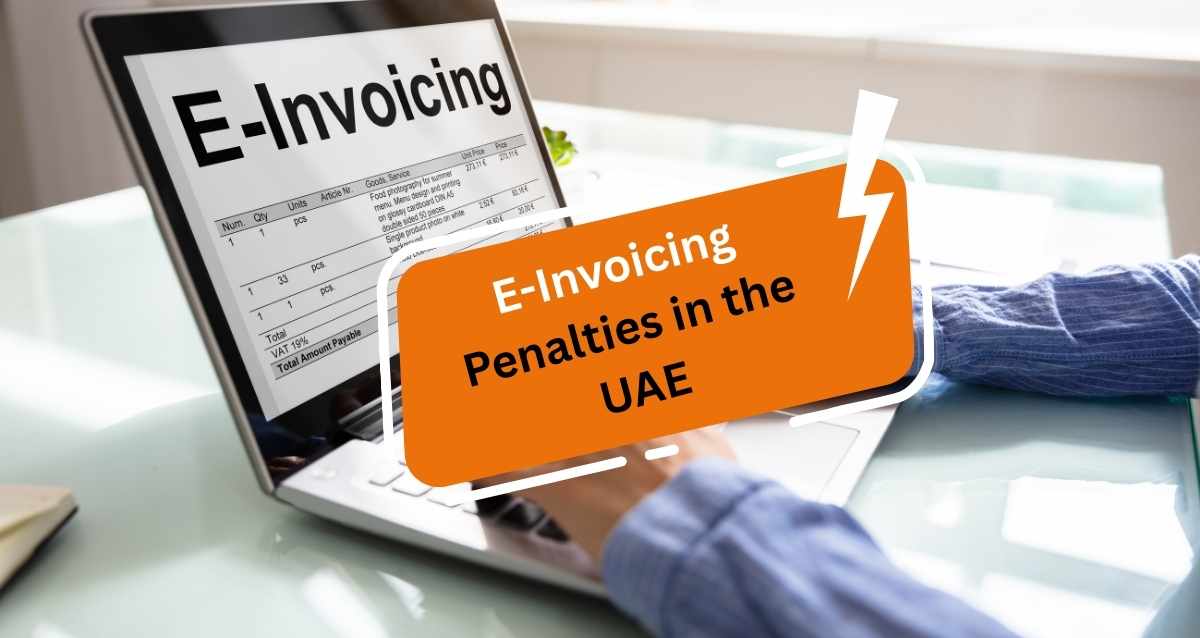E-Invoicing Penalties in the UAE: What Businesses Must Know About Cabinet Decision No. 106 of 2025
The UAE is steadily moving towards a fully digital tax ecosystem, and one of the primary changes in this journey is the shift to e-invoicing. This change impacts the business in every industry, making it essential for businesses to make important decisions. With the latest release on Cabinet Decision No. 106 of 2025 on Violations and Administrative Penalties, the Federal Tax Authority (FTA) has finally specified the consequences for not meeting the E-Invoicing regulations.
This blog lists down every penalty in the easiest terms, pointing out the most common risks businesses may face, elaborating on every measure that needs to be taken to avoid fines as E-Invoicing is introduced.
Why the UAE Introduced E-Invoicing Penalties
Reason to implement these penalties:
- To make sure all businesses in the UAE use the same invoicing standards
- To ensure instant approval of the invoice
-
To ensure the prevention of fake or incorrect invoices and reduce tax evasion
-
To improve the overall accuracy of tax reporting
- To ensure easier communication amongst businesses, suppliers, service providers, ASP and the FTA.
To be compliant, businesses need to set up e-invoicing from a technical point, and make sure invoices are issued, sent, reported, and any system errors or failures are fixed.

Overview of Cabinet Decision No. 106 of 2025
This decision covers the violation of the rules for the Electronic Invoicing System under Federal Decree-Law No. 28 of 2022 (Tax Procedures Law) and related e-invoicing regulations issued by the Ministry of Finance
Points to be noted:
- If the companies are voluntarily issuing e-invoicing before it’s mandatory, they are safe from the penalty.
- Both Issuers (sellers) and Recipients (buyers) can face penalties if they don’t follow the required procedures.
Penalties for E-Invoicing Violations in the UAE (Full Breakdown)
These penalties are listed in the table attached to Cabinet Decision no. 106 of 205
1️. Failure to implement the e-Invoicing System or appoint an Accredited Service Provider (ASP
Penalty: AED 5,000 for each month of delay or part of a month
This applies when businesses:
- Upon missing the deadline to appoint the ASP.
- Upon failure to integrate the ERP/Finance software with the e-invoicing system.
- Upon failure to configure the system to issue structured electronic invoices
This is expected to be one of the most common mistakes during the early phase of e-invoicing.
2️. Failure to Issue and Transmit Electronic Invoices within the Required Time
Penalty: AED 100 per invoice, up to a maximum of AED 5,000 per month
This applies when businesses:
- Keeps issuing PDF or manual invoices instead of e-invoices
- Issues an invoice but doesn’t send it through the e-invoicing system
- Sends an invoice that fails technical validation and does not resend it properly
3️. Failure to Issue and Transmit Electronic Credit Notes within the Required Time
Penalty: AED 100 per credit note, up to a maximum of AED 5,000 per month
This applies when a business:
- Issue credit notes manually instead of issuing the e-invoicing system
- Fails to send credit notes through the system
- If the credit note is not accurately linked to the original invoice
4. Failure to Notify the Authority of Any System Failure
Penalty: AED 1,000 per day or part of a day
A system failure refers to any technical disruption that prevents proper tax reporting or data submission. This may include ERP or accounting software outages, API connection issues between the ASP and the FTA, hardware malfunctions, data corruption or loss, or disruptions in internet or network access.
If a business experiences any of these issues but fails to inform the Authority promptly, a daily penalty will apply, accumulating until the issue is officially reported.
5️. Failure by the Recipient to Notify the Authority of a System Failure
Penalty: AED 1,000 per day or part of a day
Buyers must report any problems that stop them from receiving or validating e-invoices.
6️. Failure to Notify the ASP of Changes to Registered Data
Penalty: AED 1,000 per day or part thereof
Businesses must update whenever there are changes to:
- Trade license details
- Legal Company name
- Address and contact information
- Tax registration numbers
- ERP or other system changes
How to Avoid E-Invoicing Penalties
✔ Choose an Accredited Service Provider (ASP) early
Don’t wait until the last minute-setting up and onboarding takes time.
✔ Plan your invoice process
Make sure sales, credit notes, returns, and intercompany transactions are all handled digitally.
✔ Upgrade your ERP
Your system needs to support structured XML invoices and send it in real time.
✔ Train your team
Every department - Sales, accounts, procurement, billing, and IT teams needs to be aware of their role.
✔ Monitor compliance dashboards
ASPs provide tools to quickly spot failed invoices
✔ Maintain a system failure policy
Keep a process that helps to detect, escalate, and report system issues to the FTA.
Need Professional Help With E-Invoicing Implementation?
Flyingcolour Compliance Services LLC assists businesses in:
- Selecting the right Accredited Service Provider (ASP)
- Setting up ERP systems and preparing them for e-invoicing
- Organising sales, purchase, and intercompany invoices.
- Training staff and managing process change
- Monitoring compliance regularly
- Setting up documentation and procedures for system failures
Frequently Asked Questions (FAQs)
1. Will e-invoicing penalties apply during voluntary implementation?
No. Penalties will be implemented upon the beginning of the mandatory phase.
2. Do penalties apply to B2C invoices?
Not as of now. B2C invoices are excluded until further update of the ministerial decision.
3. Can penalties be waived?
The FTA may reconsider penalties, provided that we share proper supporting documents and submit them on time.
4. What if my ASP system crashes?
You need to report the system failure to both ASP and the FTA to avoid penalties.
5. Is PDF sharing still allowed?
Yes, however, a legally valid invoice must be an e-invoice issued through an invoicing system.
To learn more about E-Invoicing Penalties in the UAE, book a free consultation with one of the Flyingcolour team advisors.
Disclaimer: The information provided in this blog is based on our understanding of current tax laws and regulations. It is intended for general informational purposes only and does not constitute professional tax advice, consultation, or representation. The author and publisher are not responsible for any errors or omissions, or for any actions taken based on the information contained in this blog.



